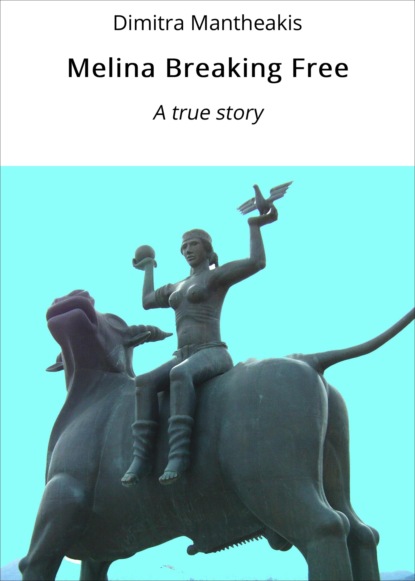- -
- 100%
- +
When he got his breath back he lit a cigarette and stroking her hair he whispered, “Did I hurt you Maria? It was your first time, wasn’t it?”
“Yes, Demosthenes, it was my first time and it was wonderful!” she replied, kissing him on his neck. A little later Maria, without any reserve, stroked his penis until it became as hard as steel. He re-entered her, triumphantly, and their bodies were soon flooded by supreme satisfaction.
Dawn was breaking when exhausted from their all-night embraces and with their bodies soaked in sweat, despite the morning chill, they pulled themselves apart. Naked as they were, they went into the water to wash off the damp residue of their night of love. Wet and trembling from the cold of the dawn air they put on their clothes, hugged, and kissed each other goodbye. There was no need for any elucidation at that moment. The adventure was about to end with the coming appearance of the first rays of the sun that in a little while would dissolve the magic of the evening. For the passion that had given them such satisfaction there was no tomorrow. They would each follow a private path back to their responsibilities and obligations.
Demosthenes watched Maria walking away until she disappeared behind the wooden garden gate of her house. He felt a tightening in his heart and a bitter taste in his mouth. He had unexpectedly stumbled on the Ultimate, and he had lost it, without having the right to pursue his claim. With a deep sigh he started on his way back with his mind and soul stamped with the image of Maria who had become his wife, his ideal and inestimable companion, for just one night.
Back at her grandmother’s house, Maria, lying fully clothed on her bed, brought back to mind, again and again, every moment, every word, and every movement of the dreamlike night. She pinched herself to make sure she was awake, that it wasn’t an illusion, that everything that had happened was real. It didn’t bother her that she had given herself so easily to a stranger, offering him her virginity. If she had a hundred virginities she would have sacrificed them for the indescribable fulfillment she had experienced. Neither did she think about her fiancé, Yannis, nor about his reaction when in two months time he would probably discover that someone else had reaped the fruit of her harvest. Respecting her innocence and her virginal shyness, all Yannis had enjoyed until then were some kisses and a few embraces. At this very moment, no external circumstance, no social restraint could spoil the pleasure springing from the echo of her happiness and the relaxation she felt in her body, sated as it was with love.
A shadow would be cast over the memory of that strange evening the next month when Maria returned to Athens and vainly waited for her period. The strong and uncontrollable passion in Aegina had borne fruit. The odd thing was that the thought of an abortion never entered her mind, even for a moment. Her bizarre stubbornness carried the risk of exposing her. She started desperately looking for solutions beyond the only logical one, an abortion. She decided to confide in her cousin, Myrto, the “fast” one of the family who kept others’ secrets safer than if they were in a bank vault. Myrto, so full of charm and coquetterie and the joy of life, didn’t give a hoot about the constant criticism from her family circle that often stigmatized her “unbridled”, as they called it, behaviour, and her frequent switches of sexual partners that made her relatives bow their heads in shame for the lost lamb of their clan. Good-natured Myrto had solutions for all of their amorous entanglements. When she found out about Maria’s doings she advised her cousin to keep the baby, and since she was about to get married, to present the child as Yanni’s. Maria was horrified when she first heard the proposal. She did not want to deceive her fiancé, but, word after word, Myrto convinced her that there was no other way. “Nobody,” she said, again and again, “can be hurt by things they do not know.”
She repeated it so many times that Maria succumbed to her advice.
Maria married Yannis and seven months later she gave birth to her “premature” daughter, Urania. Myrto had fixed the problem with the obstetrician convincing him that with his collusion he was saving a potential victim from the wrath of her relatives who would severely punish Maria who had strayed from the narrow path. Yannis did not for a moment have any doubts about his premature daughter, on the contrary, he concentrated all his love and devotion on the two women in his life. The arrival of a second daughter, and later the birth of twin sons completed his circle of happiness. Maria was an exemplary mother and wife and ran her household with perfect order and discipline. No one ever learned her secret and no one would learn it in the future. Only at night when she felt the lukewarm embraces of Yannis did her mind travel to that enchanted August evening brimming over with sexual passion and her body sought that urge, that intoxicating sense of excitement that was now only a distant and priceless memory. She knew she would never again experience such sexual tension, never would her body seek with an almost obsessive desire to have a male enter and pull her apart as Demosthenes had done then. On the one hand she was lucky because Yannis did not notice, or pretend he did not notice, that someone else had beaten him to the looting of her vaginal passage, and Maria was grateful for his discretion.
When her schoolmates left Melina at her doorstep she entered the dilapidated two room house where the six members of her family lived. Her mother, on her knees, was brushing the wooden floorboards with ochre. Despite the freezing February cold, beads of sweat stood out on her forehead. Each time she stretched her hands forward to spread the mixture on the planks “Ohhh…Ohhh” sounds came from her lips, but that which made the girl’s heart tighten was the expression of sorrow in her mother’s eyes. The endurance of a lifetime of tribulation was focused in that look, or was it despair? How many times had Melina not seen that same expression when watching her mother examine the three kitchen cupboards, looking for something to cook for her family on those days when her father’s wage had not entered the family purse because no one had hired his cart? The pitiable woman tried to dilute the trachana or the rice soup to make it suffice for all the mouths she had to feed. Melina observed her mother time and time again when with her back bent she washed the family’s clothes on the washboard out in the yard in the severe cold in the middle of winter or in the scorching heat of summer, rubbing, rubbing, rubbing, with caustic ash powder until her hands were on the verge of bleeding.
They never opened up their house on a feast day nor did a visitor ever cross their threshold. They didn’t have the money to buy the essentials for those occasions. And Melina was envious then, during festive days, to see the illuminated houses of others with people coming and going, music pouring out of open windows, and her smelling the tantalizing aromas of food that made her stomach gurgle in protest at her deprivation. Melina, out of pride, never accepted invitations, knowing that she could not reciprocate. She cried to herself from time to time and on other occasions became furious at her family’s wretchedness, hurling anathema at their poverty and realizing that her grandmother’s constant solace “let us be happy that we have our health!” sounded empty to her ears, and was anything but consoling.
“Is there an illness worse than poverty?” wondered the young girl. “Is there worse torture that an empty stomach, the overcoat you don’t own, frozen hands and feet when the winter brazier dies out because there is no more coal? Money is the cure, the only cure! Without it you are nothing and others see you as nothing!”
Many similar thoughts found a nest in Melina’s mind, as if she was a grown-up woman, and they verged on becoming an obsession. The worry and humiliation with which she watched her family suffering like Christ on the Cross, but without hope for the future, was killing her. She preferred not to have been born because she could not put up with this daily anguish from as far back as she could remember. She couldn’t bear seeing her underweight siblings getting up from meals with their stomachs still half empty, and young Melina pursed her lips, promising herself she would put her life in order one day at any cost.
Mary entered her house and threw her satchel onto a chair. Her mother was spreading the green baize material over the table in the living room. “Are they going to play cards again?” wondered the girl. She was fed up twice a week hearing the knocking of knuckles on the card table and smelling stifling cigarette smoke coming through cracks in her bedroom door. Her mother Penelope, like so many of her compatriots, had acquired a card-playing habit. Wherever they looked for her, one could be sure of finding her at one or another poker or rummy table. She had long ago got over the stage of playing an innocent game of biriba and had entered very deep waters. Penelope could hardly wait for her daily family obligations to be over with, to be free to play cards either at home or at a house of a friend with the same passion.
She was a good-looking woman who took particular care of her appearance and took full advantage of the dollars sent without fail every month by her sister from overseas. Penelope felt no remorse at parting with some of this at the green felt covered table since her sister was unmarried and the money that she made from her business was more than enough for her. Penelope wasn’t doing anyone any harm by wanting to enjoy herself a little. Provincial life was so boring and the days were so much one like the other without her beloved pastime!
Menelaos, her doting husband, had a permanent weak spot for her. He went to great lengths to justify this need of hers since Penelope didn’t have the opportunity to let off steam by enjoying herself at nightclubs as she had in Athens from where he had brought her to this isolated province when he had opened his pharmacy. The whole family put up with their mother’s vice because she had been given the go-ahead by the father, the head of the family, despite the secret disapproval of the children who knew the futility of expressing any objection. Neither of their parents would take any notice.
CHAPTER 3
Iakovos rang the doorbell of his house for a long time after managing to get away from his schoolmates. He had forgotten his keys and he wondered what they were doing by not opening the door for him. “Have my mother and sister gone deaf?” he asked himself. He waited for a quarter of an hour, in vain. He then decided to go to his father’s newsagents shop two blocks away to see if his mother had gone by there. When he arrived he found the shop closed and the shops next door were also closed for siesta time. “Maybe they’re coming home via another street,” he thought, and started off again for his house. When he arrived he rang the bell, but again there was no reply. The young boy was worried now. “Could something have happened to them?” he wondered, concerned. He waited for another ten minutes and then went next door and rang Mrs. Katina’s doorbell. The woman appeared dressed in a bathrobe with curlers in her hair. “Have you seen my mother, Mrs. Katina? I’ve been ringing for a long time and they aren’t replying and the shop too is closed.”
“Come in, my boy!” the woman said. She made him sit in the kitchen and said, “They took your father away this morning. They are taking him to Athens with Aristides, the barber, and Melpo, the teacher.
“Who took him, Mrs. Katina?” he asked with an expression of worry.
“Well, I don’t know. The police…with these damned politics!” Katina replied.
“But he only came back six months ago. Why did they arrest him again?”
“My boy, I haven’t a clue. They said he refused to sign some papers and he will be sent with the others to one of the barren islands for exiles. How stubborn he is, that father of yours! He could have signed and saved you all and himself from all this bother!” Katina commented.
Iakobos went silent. What could the poor boy say! It hadn’t been the first time his father had been jailed for his political convictions. It was twice as difficult for him now because after his father was freed from jail the last time the boy had thought that their worries were finally over and that no one would bother them again, no one would bang on their door in the middle of the night, nobody would drag his father like a sack of potatoes to lead him to God-knows-what prison, God knows–to-what isolated location. The boy felt indignation welling up inside him. His anger wasn’t directed at that moment against the police; he blamed his father for his obdurateness and his adherence to inexplicable, for the boy ideologies that had been the cause of so much anguish and so many worries for them. What business of his was it to get involved in these to-dos, regularly abandoning his work and family? Wasn’t their poverty enough? Had they the luxury of getting involved in situations that only promised them trouble and no benefits? His anger brought tears to his eyes. Then he thought about his mother and sister and the fear they must have felt. He wiped his wet cheeks and nose with the back of his hand and asked Mrs. Katina if she knew where the women were.
“The were at the police station from this morning in the hope of persuading the chief officer to let him go, but as Sotiris, the taxi driver, the father of your classmate Dina, told me, they didn’t achieve anything. He saw the three of them being put into the back of an army lorry with some others from nearby villages and they left for who knows where. I believe that your mother and sister will be home soon,” Mrs. Katina said, stroking his head to console him.
Iakovos didn’t want anyone to touch him at that moment. Even his natural cheerful and playful character didn’t allow him to recover and to get over the latest hurdle by arming him with patience and endurance. The story of his father had gone on too long. The family had no business paying for his mistakes and to be left in limbo for months whenever they took him away. But whatever Iakovos thought, as angry as he got, he knew that he was helpless to do anything. These situations could not be fixed from one moment to another.
Ten minutes later from the window he saw his mother and sister with an expression of disappointment on their faces. He rushed outside and ran towards them. Kiki, his mother, hugged him silently and Tassia, his sister, looked at him sadly with her eyes red from crying. Iakobos knew what would follow, and for who knows for how long. His mother would break her back carrying crates of water and soft drinks and organizing a myriad of items, wearing out her legs to serve customers for endless hours to keep them happy so that they wouldn’t go to shop elsewhere else. Tassia would start working overtime at night at the dressmakers where she worked to earn a little more to help add to their meager income. 12 year-old Iakovos was determined to help out, as much as he could, after school at their little shop in order for his mother not to collapse from overwork. As a last resort he could do his homework behind the counter to allow Kiki to pop over to their house to prepare a meal and do her housework while Iakobos looked after the newsagents shop in the afternoon.
The three months that remained until June and the summer holidays went by quickly. The group of friends finished primary school and sat their high school entrance exams. Sarantos fought all this time to convince his father to allow him too to go to high school. Eleni, his mother, stood by him and supported him as much as she could. In the end and after interminable discussions that almost always ended up in arguments and swearing by Mitsos, his father, the mother and son managed to get his much-desired approval.
The exam results were announced and the inseparable group of friends went on successfully to the next step of their education. Each of the children kept deeply hidden in their hearts aspects of their family life, painful or happy, as well as their worries and troubles, not because of a desire to hide something, but from pride and a wish not to become objects of pity for their peers. The children were still young and they did not know that nothing would remain hidden for ever under the relentless provincial sun.
The years went by and the boys became men, almost, and the little girls of yesterday filled out and became women, each one metamorphosing with an individual style and each one harbouring her own private dreams and secret ambitions. Melina, had her mind fixed on redemption from the privations of poverty only through the panacea of money, as she had visualized it over the years in her mind, Urania, getting to know love by slipping away from the supervision of her head master father, Paulina, hoping every day there would be a miracle and that her mother’s sexual desires would cease, Dina, hoping that her taxi driver father would reform and would no longer frequent gambling dens and places of ill-repute, shaming her mother and sisters, Mary, desiring a house that would no longer be turned into a gambling nest by unwelcome visitors, Iakobos, looking forward to expanding his business to become a successful and important merchant to allow his mother and sister to stop wearing themselves out at work while his father was exiled for years on the prison island of Makronissos. Sarantos dreamed of conquering his great love, Melina, who though she must have caught on to his unrequited love from the way he showered attention on her, did not include him in her personal plans. She didn’t want any poor person near her, no matter how much she liked them. The constant humiliations caused by the wretchedness and hardships that her family had lived through, for years and years, had wounded her deeply and irreparably.
The members of the group may have been at different stages of maturity now that they had reached the age of seventeen, and they may have dreamed and planned their futures, but they didn’t know if their parents would give them the go ahead, either for further studies, or to follow a professional path in the capital, far from their small town. Conditions prevailing in their families, their worries, the hardships, and the delights or disappointments of their childhood years were deeply etched into the very depths of their being, irrespective of the fact that none of them had ever chosen to confide, even in their friends, despite the love that they shared for one another, in order not to compromise their family members more than the adults had exposed themselves to the judgment and criticism of their community. It was obvious that final decisions regarding their future would depend exclusively on the disposition and the economic capacity of each family at the specific and critical moment.
At that time, Mary, the strong-headed one of the group, was already under siege, so to speak, by a young neighbour, Anesti, who had studied architecture at Bologna in Italy and on his return to his country after an absence of seven years wanted to establish himself professionally and to settle down. He wanted a hometown girl with whom to create a family after all the affairs he had with girls belonging to a variety of nationalities at the overseas university. Pleasing in appearance, he was soon targeted by mothers as a potential husband for their daughters who were much attracted by the title “educated abroad”, as they said to their friends. Three or four matchmaking proposals did not tempt him in the least even though the brides had a respectable dowry. None of the girls attracted him sufficiently for him to give up his freedom.
He met Mary one afternoon at his house when she had come to visit his sister Niki. Mary in no way resembled the slightly-built child he remembered from the sixth grade of the local primary school. She had become a tall, slim, perfectly proportioned young woman with a pretty face. The only thing that brought to memory the cheerful young girl of the past was her long, carefully-groomed red hair that had always been her trademark characteristic.
In the beginning Mary did not take much notice of the young man’s discreet approaches. Later though, influenced by repeated compliments voiced about him by several girls who had set their sights on him, she started noticing him, finding him to be very much to her liking. In two months they were in a relationship and Anesti, who had fallen in love with her, felt he was walking on air. Mary, it was true, didn’t feel the same way for Anesti. She found him interesting, she liked him, she was flattered by his choosing her from among so many rivals who wanted to lay claim to him, but that was as far as her sentiments for him went.
The next month Anesti asked her father for Mary’s hand. The pharmacist replied that Mary would have to finish high school first, but the young man was impatient. He tried to impress on her father that his daughter would not need any qualifications as she would become his wife and the mother of his children. He did not want Mary to work and if in the future she were to become bored at home, she could occupy herself at his office which was not short of architectural assignments for houses and shops. But Mary, even though she was a very bright student, wanted to get married to escape the restrictions of life at home. She would be able to go out with her husband whenever she wanted, to stay out late in clubs, to travel and to run her house the way she wanted to as its only mistress. Her mother, her ally, had two more daughters to marry off and considered Anesti to be a godsend present for their family because he didn’t demand a dowry. Their finances were unable to allow them to live well and at the same time to provide money and homes for all three daughters, according to the social custom. The pharmacy provided for their needs, but left no room for savings, let alone any investment in property. The help that they received from their sister-in-law was for exclusive use by Penelope for her personal needs and she selfishly did not share this money with anyone else.
Despite her mother’s logic and Mary’s own wishes, the pharmacist’s inflexible resolve for his daughter to finish high school, and then to do whatever she wanted, prevailed. Anesti gave in. He wanted to have good relations with his future in-laws, and, in any case, the waiting period was limited to just a few months. The two families agreed to keep the engagement secret in order to avoid problems for Mary at school. The engaged couple limited their meetings to visits to relatives’ homes and no one suspected that there was anything more than mere friendship between them. The young architect satisfied himself with a few snatched kisses and Mary’s lack of experience and her innocence thrilled him. He was not in a hurry to possess her. In a little while she would belong to him, would be his wife and he would have the opportunity to teach her, step by step, everything that she did not know in the sexual sphere, a prospect that built up sweet anticipation in him.
In the meantime the other hopefuls did not give up their dreams since they were unaware of Anesti’s commitment to Mary. Without their mothers’ knowing they phoned him, offering to meet him. It was plain that they wanted to use their physical charms to tempt him and to make him see them differently, with the prospect of their becoming a permanent fixture at his side as his wife. Anesti was a male and was not about to reject the voluntarily offered fruit brought before him. When the village shops closed at lunchtime and all their fellow citizens went home to eat and to have their siesta he remained behind at his office after telling his staff to leave. He would leave the door unlocked and wait. Taking a hundred precautions, each of the young women would slip into his office and from there it would be ‘Showtime’. After two or three trite exchanges of conversation Anesti would make his move. He was surprised by the fact that the girls’ reactions were all the same, as if they had agreed on a common game plan. “Don’t Anesti! I haven’t been with anyone before. All I’ve had was an innocent flirtation before now!” and other similar phrases to convince him of the attraction of their virginity. Anesti saw things from a different angle, so much from their willingness to submit, as from the experience he discerned from their behaviour. Two out of four visitors may not have “gone all the way” but they were supremely familiar with everything else in the repertoire of sexual acts. The other two, from the first half hour, and after receiving the exciting caresses of the experienced man, gave themselves without resistance and begged for him not to pull out. Their screams of passion were so loud that Anesti, to avoid getting into trouble, had to seal their mouths with his hand for their cries not be heard by a neighbour or a passer-by outside.






